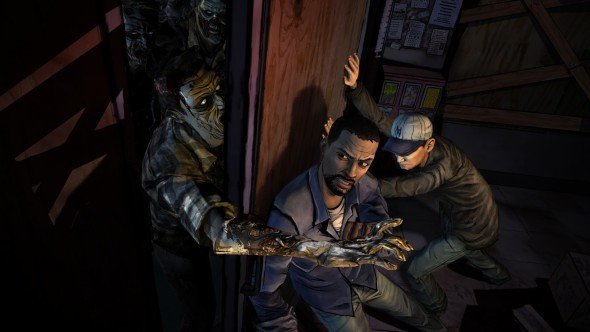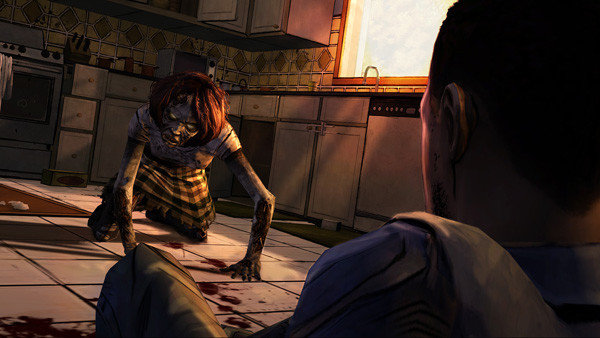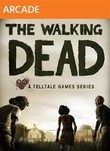It's a stereotypical enough scenario - what if there was a zombie outbreak, and no-one knew how to control it? That's the story behind The Walking Dead, a popular series of comic books and a US TV show, which follows the tale of survivors of just such an outbreak in Georgia (in the US, not the country near Russia). But far from other games, which would see this as an excuse for an all out gore fest, with protagonists armed to the teeth who don't care about the hordes they're slaying (see: countless other games), instead, the Walking Dead hits a lot closer to home, by focusing on the normal, every day people, caught up in a nightmare scenario.
The Walking Dead is a point and click game by Telltale, the people who previously bought us Jurassic Park, and the much cheerier Sam & Max and Strongbad games. Moving your character with the left analogue stick, and moving an on screen cursor with the right, the Walking Dead has a slower pace than most "zombie" games, although fast reactions can still be required - they're just used in other ways.
You play as a man named Lee Everett, a deliberately ambiguous character, with a shady history. After being thrown out of a police car that was taking you to prison (for a crime you're initially kept in the dark about), you awake to find your driver outside the car, and a trail of blood behind him. It seems he didn't leave the car of his own accord, but was instead dragged from the car, and killed - at least for now. It doesn't take long to discover who was behind the attack, as a group of shuffling undead appear, and give chase, forcing you to leap over a fence, into the safety of a quiet back garden. Exploring the house in an attempt to find help (your leg was injured in the crash, and you're bleeding), you find a scene of chaos - bookcases up-turned, blood on the floor, and three frantic answerphone messages from an incredibly worried parent. Initially calling to warn her babysitter that she wouldn't be back that evening, after her husband had a run in with a "crazy guy" and had to go to hospital, the messages soon turn to sheer terror, as you discover Atlanta's been placed on lockdown, as more and more people begin to get infected. The terrified mother pleads with her daughter, Clementine, to call the police if she can hear her, before trailing off in tears. Exploring the kitchen, in one of the draws, you find a walkie talkie, through which a child's voice crackles. It's Clementine - an eight year old girl, who's survived on her own for several days, by barricading herself into her treehouse.
The first (living) adult to set foot in her house for days, Clementine is initially introverted, yet pleased that you're there - and it's this relationship between Clementine and Lee that's one of the most interesting parts of the game. Clementine is a young girl - she's terrified that she's been left on her own, she's worried about what's happened to her parents, and she's seen violence that no-one should have to see - yet alone a child, but initially, you'll have to fight to win her trust. You're a stranger, after all. Through the conversations you hold with her, you'll be faced with tough decisions - one of the earlier conversations asks if you've ever killed one of the zombies - and you genuinely don't know what to say. Do you admit it, and risk losing her trust (after all, what if she turns and decides you're a lunatic?), or do you lie, and run the risk of her eventually finding out? The choices you make will affect your relationship, not only with Clementine, but also with any characters who may be in earshot. Some may appreciate you trying to look out for her; others may not - but everyone will have an opinion of what you're doing - and the actual story of the game will change to reflect that.

You'll come to rely on your fellow survivors on several occasions. Best that they can trust you too.
As you progress through the game, you'll join together with a group of survivors, trying their best to make sense of the changing world around them. While other zombie games feature shooting as their main attraction, it's the conversations that take centre stage here, as through the actions you take, you'll be able to shape the game's story for yourself. Full of believable, human characters with their own strengths and weaknesses, the game's incredibly well written and acted, which makes many of the decisions you have to make so much harder. There's often no middle ground here, either - your options are just several shades of grey, with no easy decisions. Because you're with such a ragtag band of people, each with their own beliefs, traits, and personalities, it's next to impossible to avoid treading on any toes, because in so many cases there is no right thing - only different degrees of wrong. And in a game where the entire story revolves around trust (after all, would you risk your life for someone you didn't know if you could trust?), you'll constantly be making difficult decisions. It's nice, however, that your actions are reciprocated. Stick up for someone, and they'll remember at a later date, and may help you out of a tricky situation. Your standing with members of the group changes with each and every decision you make, and it's balancing things - acting with your heart, or your head, that's the interesting bit. Sadly, the game seems to make a habit out of letting you build relationships with characters, only to then make you choose which one of them you want to save, and which you want to let die - and there's never an option for choosing both.
Throughout the course of the game, you'll come across a wide range of characters. There's Kenny and his family - Katjaa, a vet, and Duck, their son, who Kenny jokingly describes as "thick as a bag of hammers"; budding reporter Carley, who's a hot shot with a gun; computer nerd Doug (who Carley seems to fancy); and the stubborn old man, Larry, who's aggression often gets the better of him. Forcing a group of people with very different personalities to rely on each other for survival is an interesting idea, and it's interesting to see how people's opinion of you changes as you carry on. One of the characters, Lilly, seemed to change her opinion of us on a whim - at one moment, she hated us (blaming us for her father having a heart attack), while the next, after a peace offering of an energy bar that we'd scavenged, she seemed fine. Amazing what a difference some food makes?

This is where we died. Which made us start all over again. Sigh.
But while its storyline may be gripping, there are a few problems with the Walking Dead, not least of which is its accessibility. It's bizarre - for a company that's so often aimed its games at a more casual audience, and as such, put a huge focus on making their games as easy to pick up and play as possible, the Walking Dead seems to be incredibly hard to find your way around - at least to begin with. The cursor you move with the right analogue stick actually relates to the A/B/X/Y buttons on your controller (at least on the 360), and yet it's not at all made obvious that this is the case. While you can optionally choose to label each of the four prongs of the cursor with the relevant buttons, it really should be turned on from the beginning. Similarly, there are some bits that rely too much on quick reactions - there are several button mashing segments where you're fighting off zombies, and many of the decisions in the game are actually timed. While we can understand the logic behind it (by forcing you to choose between the options quickly, the game tries to make you act on instinct rather than on logic - as you would in a real situation), there really should be an option to turn it off, as some of the choices tick by rather quickly, and it's annoying to end up having either chosen the wrong thing, or ignored someone because we ran out of time. Similarly, we came across another problem right near the start of the game, when we were attacked by a zombie. Chasing us across the floor, you have to position your cursor over her head, then press the indicated button to kick her away, as you slide towards the door. When you get there, Clementine appears, holding a hammer. The problem is, it's rather easy to miss this, and Clementine isn't really loud enough with her offer of "here..." to be heard over the groans of the zombie. While we managed this OK, one of the other staff at Outcyders initially didn't spot the offer of the hammer, as they were too busy trying to kick the zombie away. Eventually, though, the zombie got past the kicks, and killed her, giving her a game over. Which sent her all the way back to the beginning of the game. Yes, you can die in this game - and yes, there are nowhere near enough save points. Having to replay the first twenty minutes all over again because you didn't spot a badly signposted hammer is more than a little bit annoying - and something a well timed save point could easily have remedied. In fact, we'd very much like the option to save the game for ourself, rather than having to rely on the game to "autosave" for us. We think we're big enough to be trusted now.
On the whole, though, the problems can't take too much of the sheen away from an incredible start to a series of downloadable games. With five episodes due, and your reactions set to shape the entire series from start to finish, there's much yet to come - and at only 400 points per episode (£3.40ish - PS3 and PC owners can buy a season pass for around £15.99), while the episode only lasts around an hour and a half to two hours, with so much incentive to replay the game, it still feels like decent value for money too. In fact, our only real problem comes with the difficulty of initially adapting to the interface, and the lack of ability to save.
For every developer who thinks sticking gratuitous amounts of violence in their game instantly makes it "mature", they really should think again. With a genuinely adult subject matter, blurry morals, and so many difficult decisions to make, The Walking Dead is how a "mature" game should really be.
Format Reviewed: Xbox 360



















